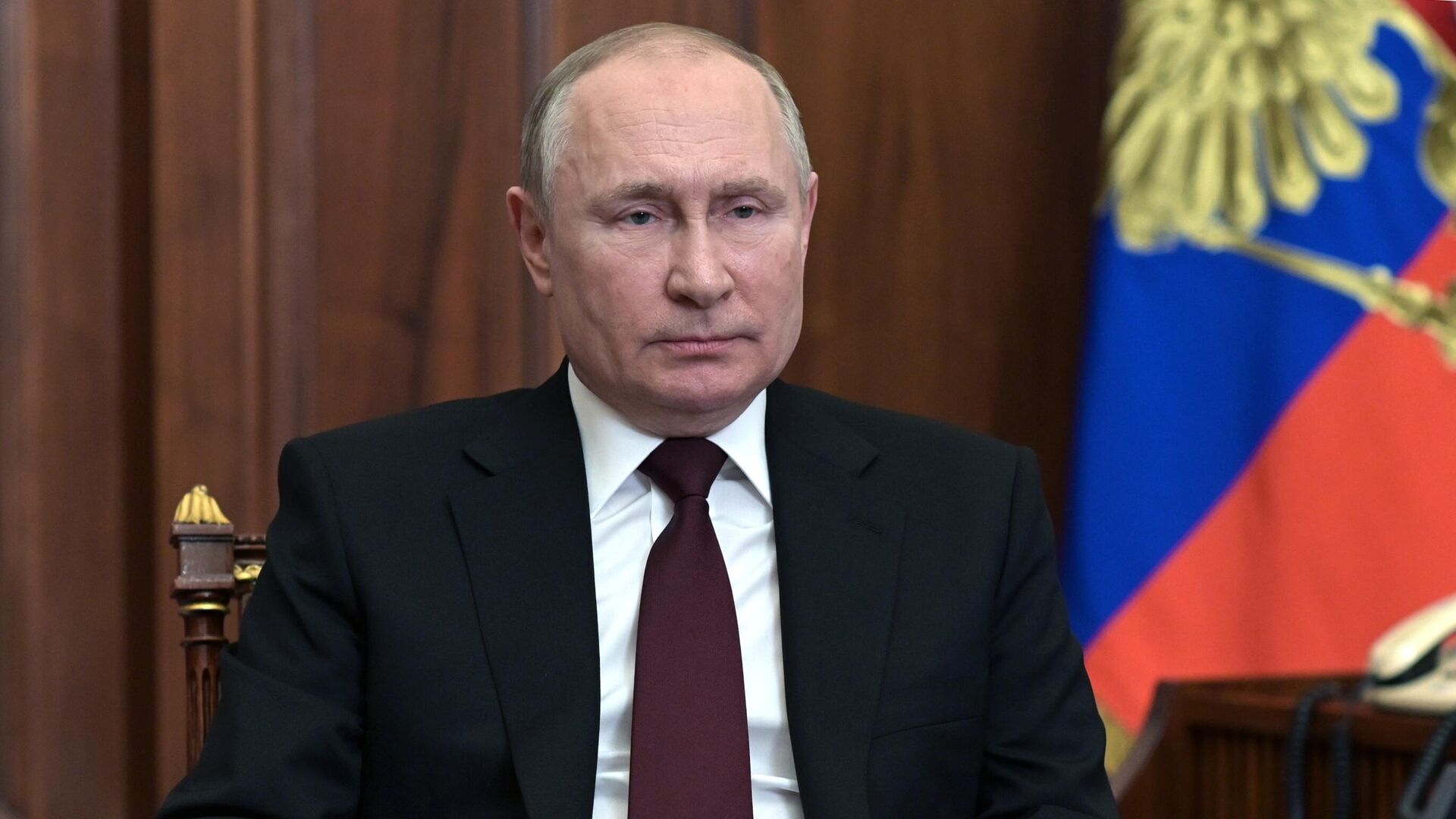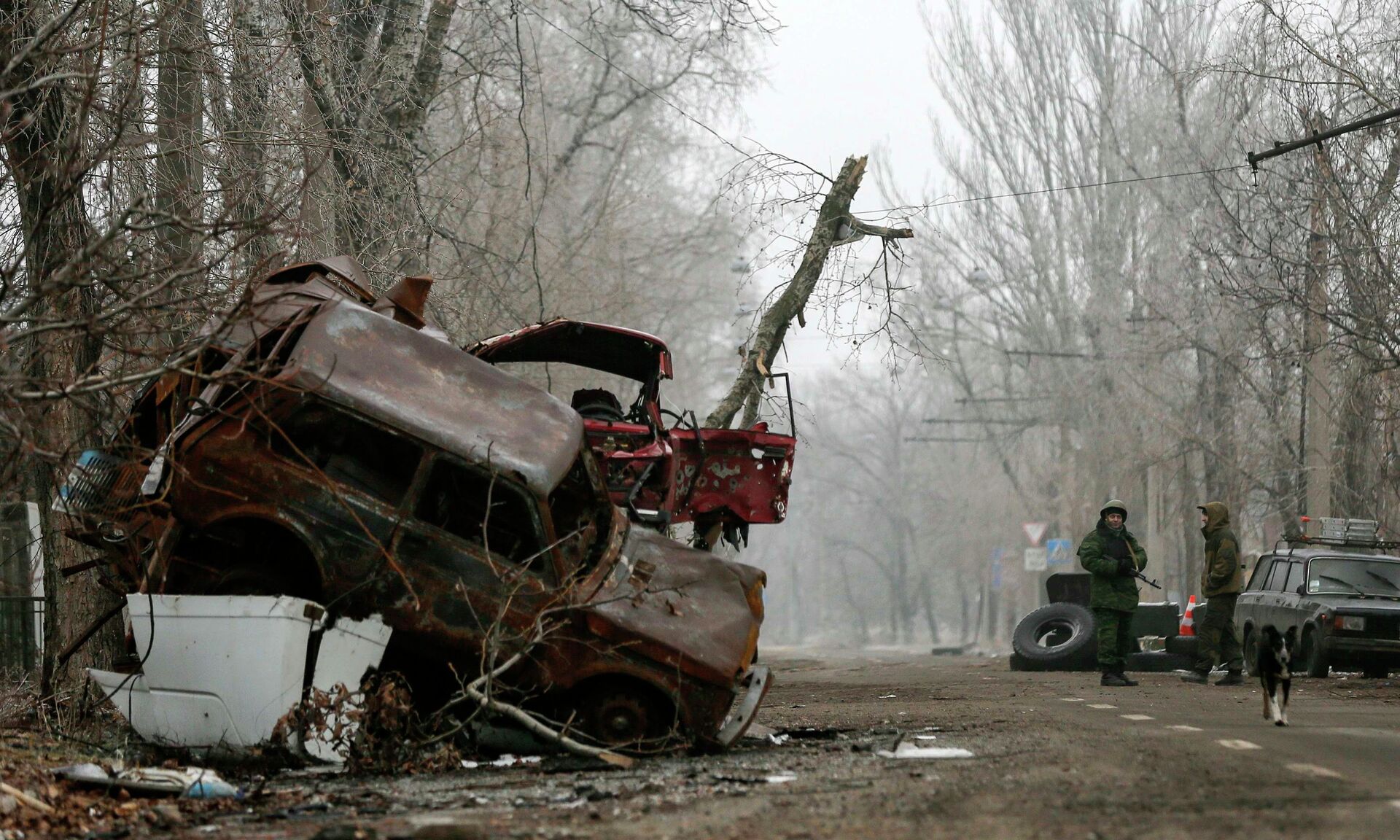https://sputnikglobe.com/20220221/russia-recognises-donbass-republics-independence-1093241178.html
Russia Recognises Donbass Republics' Independence
Russia Recognises Donbass Republics' Independence
Sputnik International
Earlier in the day, in an emergency session of the Russian Security Council, the Russian president consulted with ministers, senior security officials, and... 21.02.2022, Sputnik International
2022-02-21T19:36+0000
2022-02-21T19:36+0000
2022-10-19T20:59+0000
donetsk people's republic
recognition
russia
lugansk people’s republic
https://cdn1.img.sputnikglobe.com/img/07e6/02/15/1093247494_0:0:2741:1543_1920x0_80_0_0_c2ed9f76b37c3aa49a7e13e2431e3c7d.jpg
Russia has recognised the independence of the Donetsk and Lugansk People's Republics, President Vladimir Putin has announced."I deem it necessary to make a decision that should have been made long ago - to immediately recognise the sovereignty and independence of the Donetsk People's Republic and the Lugansk People's Republic", Putin said.Putin called on Kiev to "immediately stop hostilities" against the newly recognised states, warning that "otherwise, all responsibility for the possibile continuation of bloodshed will be entirely on the conscience of the regime ruling Ukraine".Ukraine's Tumultuous Fate"Ukraine is not just a neighbour to us, but an inherent part of our history, culture and spiritual space. These are our comrades...our family, people we have blood and family ties with", Putin said in an address to the nation Monday night outlining his decision."Modern Ukraine was completely created by Russia, more precisely by Bolshevik, Communist Russia. This process was started immediately after the 1917 Revolution", Putin said. The president suggested that Ukraine saw its territory expand at "historic Russia's" expense after the revolution, and at Poland's expense after the Second World War, with Poland receiving compensation in the form of German lands to its west. He also recalled that Soviet leader Nikita Khrushchev cut Crimea off from the Russian Soviet republic's jurisdiction and handed it over to the Ukrainian Soviet republic in 1954.After the collapse of the USSR, Putin said, Ukraine was gradually taken over by nationalist forces and oligarchs who had "nothing to do with" its achievement of independence. At the same time, Putin recalled, Russia continued to work with post-Soviet Ukraine, to act in an "open and honest manner with respect to Ukraine's interests", including through growing trade cooperation, which reached over $50 billion per year by the early 2010s, and in subsidising the country's development to the tune of $250 billion between 1991 and 2013.NATO DangerPutin suggested Ukrainian radicals backed and funded by the US took direct advantage of popular anger over corruption in 2014 to stage a coup, with the country's current "patriotic" authorities beginning a "decommunisation" campaign and leading the country toward de-sovereignisation and total subservience to the West, while marginalising the Russian-speaking community, undermining the rights of Orthodox believers, and posing a danger to Russia's security.Putin accused the current authorities in Ukraine of seeking to drag other countries into a war with Russia. "We have also heard statements about Ukraine threatening to create a nuclear weapon", he said. The Russian president suggested this was not an "idle threat", with Ukraine possessing Soviet-era nuclear and missile technology to make a push to create such a weapon. "We cannot help but react to this real threat", he warned. Putin added that Moscow could not even exclude the danger of Ukraine receiving assistance from the West in building a nuke, given the billions of dollars in military assistance already sent to Ukraine by NATO nations in recent years.Putin recalled that despite posing no threat to the Western alliance after the Cold War, Russia has received five waves of NATO expansion - nothwithstanding promises in the early 1990s not to do so. "They simply lied to us", he said.The Russian president also pointed to the deployment of dual-use US missile defence systems in Eastern Europe which can be used to attack targets deep inside Russia, and said the military threat to Moscow will increase "manyfold" as the number of these systems inevitably grows. He added that the deployment of NATO radar equipment in Ukraine would allow them to effectively control airspace inside Russia."American strategic planning documents - documents contain the possibility of carrying out a so-called 'preemptive strike on enemy missile systems'. Who the main enemy is for the US and NATO we know. It's Russia", Putin said.Security Guarantee Proposals IgnoredPutin recalled that Russia laid out a pair of draft security treaties for consideration by the US and NATO in December in a bid to defuse the current crisis. Unfortunately, he said, the West has rejected them, including key requests from the Russian side that NATO halt its eastward expansion, avoid the deployment of strike systems, and stop the buildup of military infrastructure in the Eastern European countries that joined the alliance after the signing of the Russia-NATO Founding Act of 1997.Hinting at the possibility of new sanctions against Russia over its decision on the Donbass, Putin suggested the West has always had "only one goal - to hold back the development of Russia. And they will do it, as they did before, even without any formal pretext. Simply because we exist".Security Council DiscussionEarlier Monday, speaking at an emergency session of the Russian Security Council in the Kremlin, Putin said that the negotiating process on the Donbass has reached a dead-end. He specified that the discussion on the future of the self-proclaimed republics was about recognising them as independent states, not a matter of their becoming part of Russia.Vyacheslav Volodin, speaker of Russia's lower house of parliament, asked Putin to consider the parliamentary appeal approved last week to recognise the DPR and LNR as independent states. The lawmaker pointed out that over 1.2 million residents of the Donbass have already applied for Russian citizenship.For her part, Valentina Matviyenko, chairwoman of the Federation Council - Russia's upper house of parliament, said the time had come to make a decision on the Donbass, and called the situation in the region a "humanitarian disaster and genocide" in the heart of Europe. She noted that throughout the close to eight-year-long conflict, Russia has consistently stood in favour of a diplomatic and political solution."No one listened to us. There was an imitation of the Minsk Agreements", she said. At the same time, the chairwoman accused the West of trying to push Russians and Ukrainians, two fraternal Slavic peoples, into a war.Russian Prime Minister Mikhail Mishustin expressed support for the measure, saying it would be appropriate in the absence of any progress on the Minsk Agreements. He added that officials have spent some time preparing for the West's potential reaction to a Russian recognition of the Donbass, with these risks said to be accounted for.Later Monday, in connection with the comments made by Russian officials at the Security Council meeting, Ukrainian President Volodymyr Zelensky declared that he has carried out urgent consultations with President Emmanuel Macron of France and German Chancellor Olaf Scholz, and called a meeting of the National Security and Defence Council of Ukraine.Putin also spoke with Macron and Scholz, telling them he intends to sign a decree on Donbass. According to the Kremlin, the French and German leaders expressed "disappointment".Eight Years of WarThe conflict in the Donbass has its origins in the February 2014 Maidan coup d'etat in Kiev, in which Ukraine's unpopular but democratically elected government was overthrown by political forces favouring integration with the European Union and NATO at the expense of ties with Russia.In the spring of 2014, demonstrators across eastern and southern Ukraine opposed to the new government's pro-Western orientation and perceived efforts to clamp down on the Russian-speaking regions began organising protests and independence movements. The strongest of these were concentrated in the Russia-bordering regions of Donetsk and Lugansk. Kiev responded to the independence push by trying to crush these movements with military force, leading to the formation of local militias by local residents seeking to defend their homes, and the proclamation of the Donetsk and Lugansk People's Republics in May 2014. Elsewhere, in major eastern and southern regions including Kharkov, Nikolayev, and Odessa, anti-Kiev and pro-independence protesters were systematically jailed, assassinated, and disappeared.A full-scale civil war raged throughout Donbass between May 2014 and February of 2015, killing at least 13,000 people, injuring thousands more and prompting over 2.5 million of the region's residents to flee their homes, with over a million seeking refuge in Russia.In February 2015, the leaders of Ukraine and the three guarantor states of Russia, France, and Germany met in the Belarusian capital of Minsk to hammer out the Minsk Agreements, a comprehensive ceasefire and peace deal aimed at ending the conflict in the Donbass and reintegrating Donetsk and Lugansk back into Ukraine in exchange for broad, constitutionally mandated autonomy. Successive Ukrainian governments failed for years to make any progress on implementing the deal's political portion. In 2019, an attempt to do so by then newly elected President Volodymyr Zelensky was aborted after tens of thousands of protesters, including veterans of the Donbass war and ultra-nationalist militias, gathered in Kiev and threatened to overthrow his government.The uneasy ceasefire in the Donbass region was interrupted late last week by artillery and mortar shelling, sniper attacks, saboteur bombings, and other acts of violence, with Organisation for Security and Co-Operation in Europe observers registering hundreds of violations of the ceasefire by both sides. Last Friday, in response to the escalation, DPR and LPR leaders announced a general mobilisation and began to evacuate their civilian populations to Russia. On Monday, DPR and LPR heads Denis Pushilin and Leonid Pasechnik formally asked Putin to recognise their status as independent nations.
https://sputnikglobe.com/20220221/berlin-claims-no-promises-on-nato-expansion-ever-made-to-russia-after-publication-of-archival-docs-1093229628.html
https://sputnikglobe.com/20220221/putin-russia-has-done-everything-to-peacefully-resolve-tensions-in-donbass--1093237980.html
https://sputnikglobe.com/20220219/eu-allies-to-sanction-russias-energy--tech-fields-in-event-of-ukraine-escalation---von-der-leyen-1093170763.html
https://sputnikglobe.com/20220221/ukrainian-media-claims-zelensky-quietly-hoping-russia-will-recognize-donbass-breakaways--1093228631.html
Sputnik International
feedback@sputniknews.com
+74956456601
MIA „Rosiya Segodnya“
2022
News
en_EN
Sputnik International
feedback@sputniknews.com
+74956456601
MIA „Rosiya Segodnya“
Sputnik International
feedback@sputniknews.com
+74956456601
MIA „Rosiya Segodnya“
donetsk people's republic, recognition, lugansk people’s republic
donetsk people's republic, recognition, lugansk people’s republic
Russia Recognises Donbass Republics' Independence
19:36 GMT 21.02.2022 (Updated: 20:59 GMT 19.10.2022) Earlier in the day, in an emergency session of the Russian Security Council, the Russian president consulted with ministers, senior security officials, and members of the government to present their views on the matter and its potential political, economic, and strategic implications.
Russia has recognised the independence of the Donetsk and Lugansk People's Republics, President Vladimir Putin has announced.
"I deem it necessary to make a decision that should have been made long ago - to immediately recognise the sovereignty and independence of the Donetsk People's Republic and the Lugansk People's Republic", Putin said.
The Russian president signed the corresponding documents and asked the Federal Assembly to support the signing of treaties of cooperation with the Donbass breakaways.
Putin called on Kiev to "immediately stop hostilities" against the newly recognised states, warning that "otherwise, all responsibility for the possibile continuation of bloodshed will be entirely on the conscience of the regime ruling Ukraine".
Ukraine's Tumultuous Fate
"Ukraine is not just a neighbour to us, but an inherent part of our history, culture and spiritual space. These are our comrades...our family, people we have blood and family ties with", Putin said in an
address to the nation Monday night outlining his decision.
"Modern Ukraine was completely created by Russia, more precisely by Bolshevik, Communist Russia. This process was started immediately after the 1917 Revolution", Putin said. The president suggested that Ukraine saw its territory expand at "historic Russia's" expense after the revolution, and at Poland's expense after the Second World War, with Poland receiving compensation in the form of German lands to its west. He also recalled that Soviet leader Nikita Khrushchev cut Crimea off from the Russian Soviet republic's jurisdiction and handed it over to the Ukrainian Soviet republic in 1954.
"As a result of Bolshevik policy, Soviet Ukraine arose, which even today can with good reason be called 'Vladimir Ilyich Lenin's Ukraine'. He is its author and architect. This is fully confirmed in archival documents, including hard Leninist directives on the Donbass, which was literally squeezed into Ukraine", Putin said.
After the collapse of the USSR, Putin said, Ukraine was gradually taken over by nationalist forces and oligarchs who had "nothing to do with" its achievement of independence. At the same time, Putin recalled, Russia continued to work with post-Soviet Ukraine, to act in an "open and honest manner with respect to Ukraine's interests", including through growing trade cooperation, which reached over $50 billion per year by the early 2010s, and in subsidising the country's development to the tune of $250 billion between 1991 and 2013.
Putin suggested Ukrainian radicals backed and funded by the US took direct advantage of popular anger over corruption in 2014 to stage a coup, with the country's current "patriotic" authorities beginning a "decommunisation" campaign and leading the country toward de-sovereignisation and total subservience to the West, while marginalising the Russian-speaking community, undermining the rights of Orthodox believers, and posing a danger to Russia's security.
"Today grateful descendents have demolished monuments to Lenin in Ukraine. This is what they call decommunisation. You want decommunisation? Well, that's just fine with us. But there's no need to stop halfway as they say. We are prepared to show you what real decommunisation means for Ukraine", Putin said, referring to his step to recognise the DPR and LPR's sovereignty.
Putin accused the current authorities in Ukraine of seeking to drag other countries into a war with Russia. "We have also heard statements about Ukraine threatening to create a nuclear weapon", he said. The Russian president suggested this was not an "idle threat", with Ukraine possessing Soviet-era nuclear and missile technology to make a push to create such a weapon. "We cannot help but react to this real threat", he warned. Putin added that Moscow could not even exclude the danger of Ukraine receiving assistance from the West in building a nuke, given the billions of dollars in military assistance already sent to Ukraine by NATO nations in recent years.
Putin warned that Ukraine's entry into the Western alliance would constitute a "direct threat" to Russia's security, and that the alliance's training centres already established in the country amount to military bases - something illegal under Ukraine's own Constitution. Ukraine as part of NATO would inevitably serve as a springboard from which the bloc - which has openly designated Moscow as its main adversary - can attack Russia, according to the president.
Putin recalled that despite posing no threat to the Western alliance after the Cold War, Russia has received five waves of NATO expansion - nothwithstanding promises in the early 1990s not to do so. "They simply lied to us", he said.
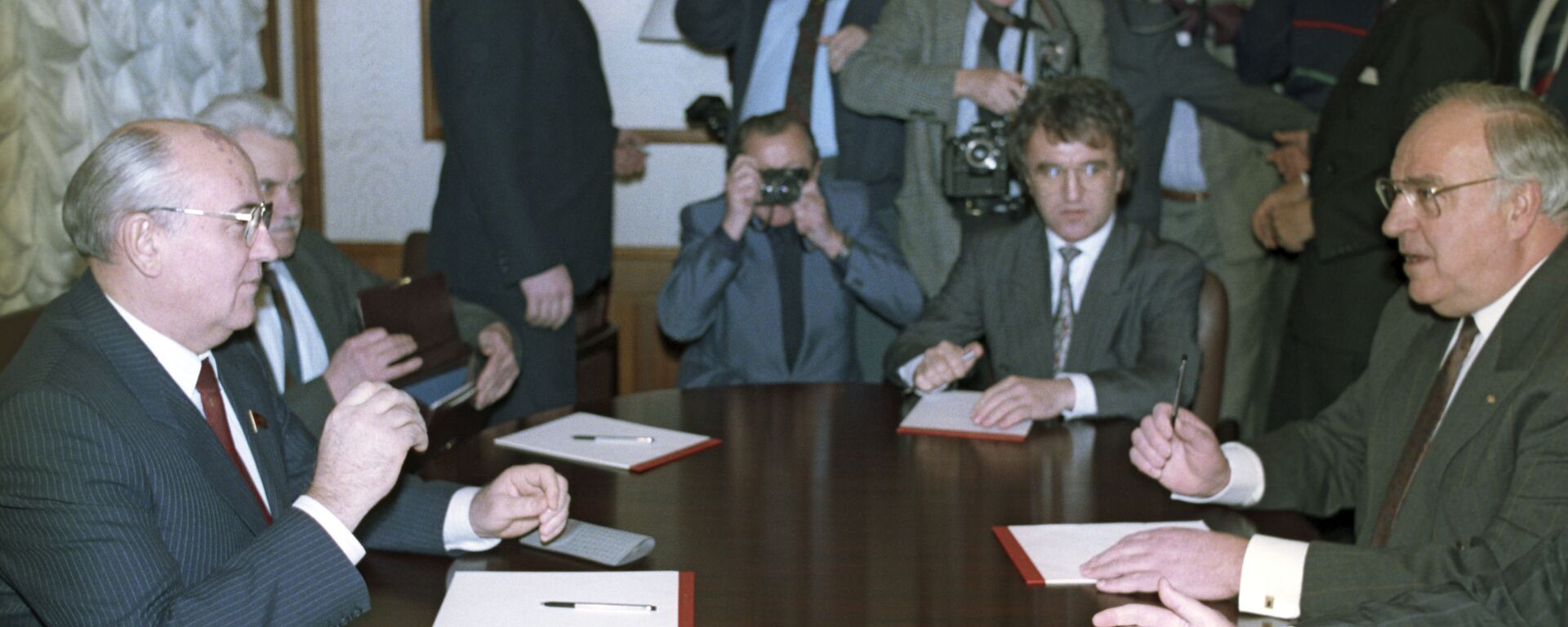
21 February 2022, 11:15 GMT
The Russian president also pointed to the deployment of dual-use US missile defence systems in Eastern Europe which can be used to attack targets deep inside Russia, and said the military threat to Moscow will increase "manyfold" as the number of these systems inevitably grows. He added that the deployment of NATO radar equipment in Ukraine would allow them to effectively control airspace inside Russia.
"American strategic planning documents - documents contain the possibility of carrying out a so-called 'preemptive strike on enemy missile systems'. Who the main enemy is for the US and NATO we know. It's Russia", Putin said.
Security Guarantee Proposals Ignored
Putin recalled that Russia laid out a pair of draft security treaties for consideration by the US and NATO in December in a bid to defuse the current crisis. Unfortunately, he said, the West has rejected them, including key requests from the Russian side that NATO halt its eastward expansion, avoid the deployment of strike systems, and stop the buildup of military infrastructure in the Eastern European countries that joined the alliance after the signing of the Russia-NATO Founding Act of 1997.
Hinting at the possibility of new sanctions against Russia over its decision on the Donbass, Putin suggested the West has always had "only one goal - to hold back the development of Russia. And they will do it, as they did before, even without any formal pretext. Simply because we exist".
However, Russia "will never compromise our sovereignty, national interests, or our values", Putin said.
Security Council Discussion
Earlier Monday,
speaking at an emergency session of the Russian Security Council in the Kremlin, Putin said that the negotiating process on the Donbass has reached a dead-end. He specified that the discussion on the future of the self-proclaimed republics was about recognising them as independent states, not a matter of their becoming part of Russia.
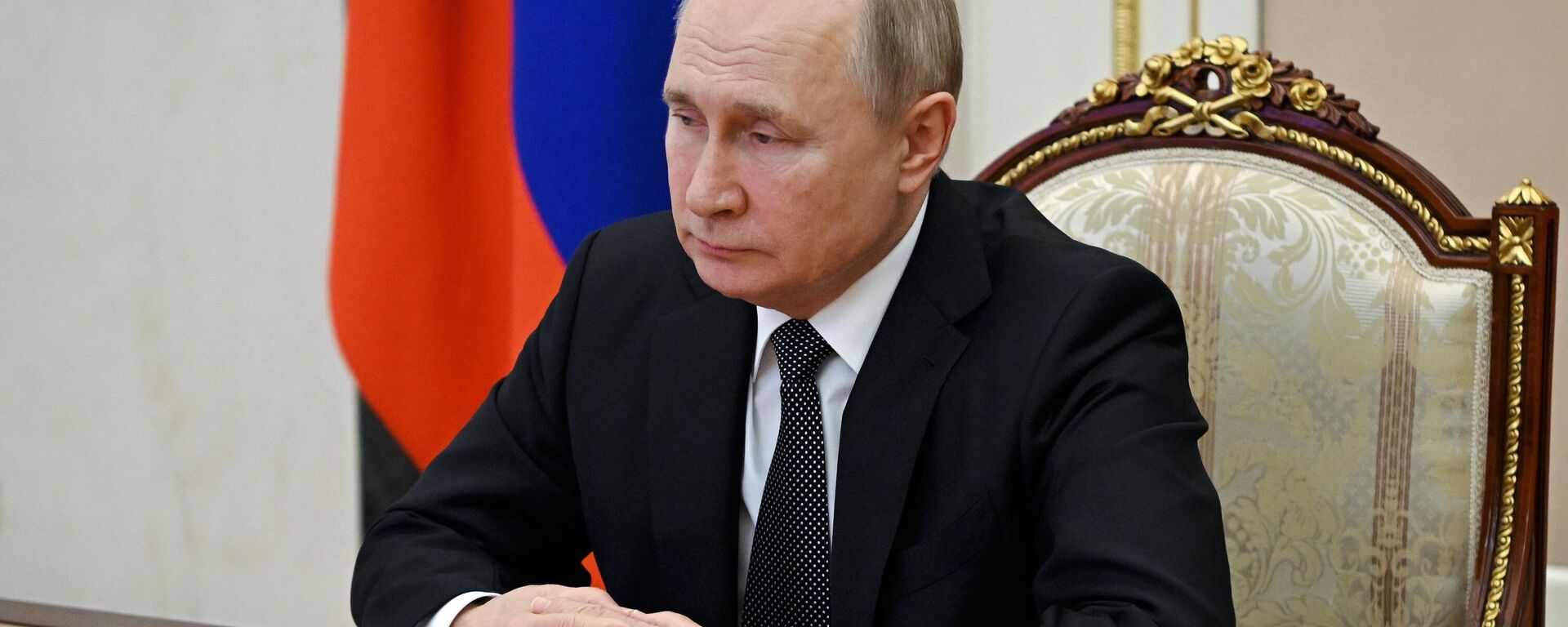
21 February 2022, 14:00 GMT
Vyacheslav Volodin, speaker of Russia's lower house of parliament, asked Putin to consider the parliamentary appeal approved last week to recognise the DPR and LNR as independent states. The lawmaker pointed out that over 1.2 million residents of the Donbass have already applied for Russian citizenship.
For her part, Valentina Matviyenko, chairwoman of the Federation Council - Russia's upper house of parliament, said the time had come to make a decision on the Donbass, and called the situation in the region a "humanitarian disaster and genocide" in the heart of Europe. She noted that throughout the close to eight-year-long conflict, Russia has consistently stood in favour of a diplomatic and political solution.
"No one listened to us. There was an imitation of the Minsk Agreements", she said. At the same time, the chairwoman accused the West of trying to push Russians and Ukrainians, two fraternal Slavic peoples, into a war.
Russian Prime Minister Mikhail Mishustin expressed support for the measure, saying it would be appropriate in the absence of any progress on the Minsk Agreements. He added that officials have spent some time preparing for the West's potential reaction to a Russian recognition of the Donbass, with these risks said to be accounted for.
Later Monday, in connection with the comments made by Russian officials at the Security Council meeting, Ukrainian President Volodymyr Zelensky declared that he has carried out urgent consultations with President Emmanuel Macron of France and German Chancellor Olaf Scholz, and called a meeting of the National Security and Defence Council of Ukraine.
Putin also spoke with Macron and Scholz, telling them he intends to sign a decree on Donbass. According to the Kremlin, the French and German leaders expressed "disappointment".
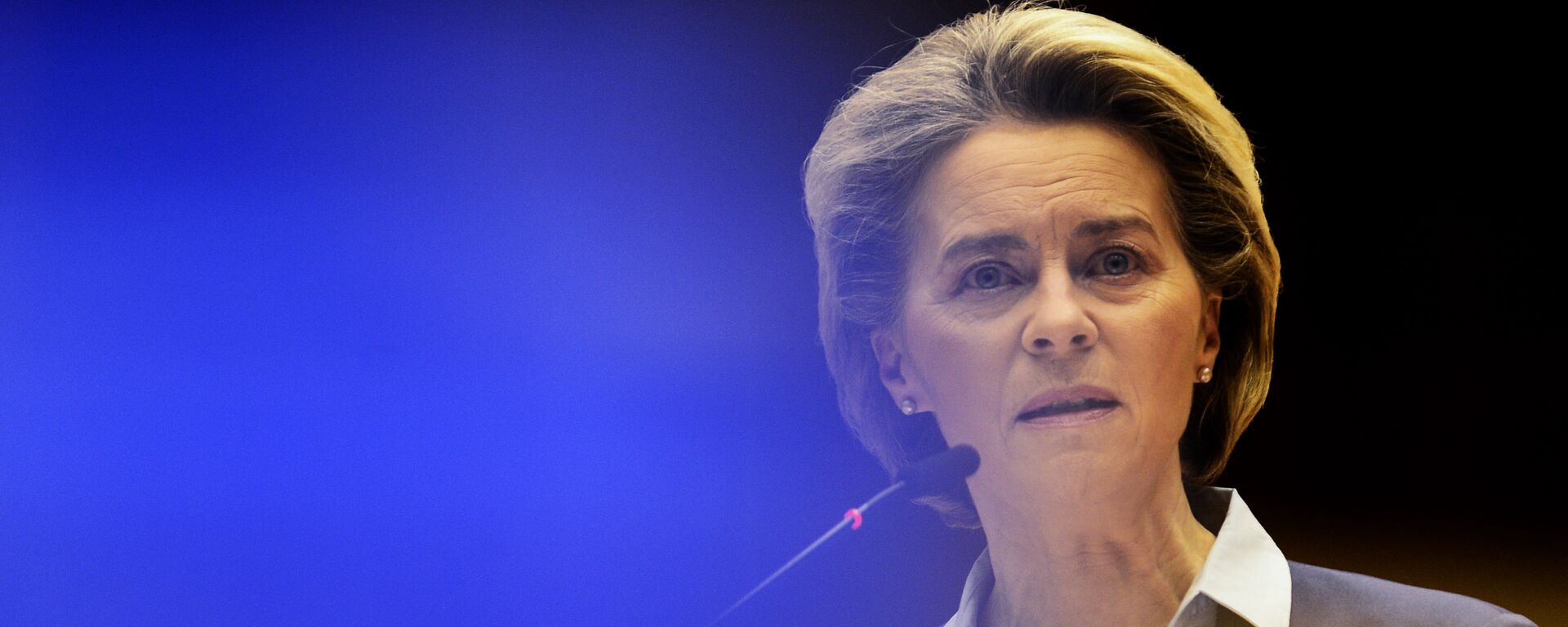
19 February 2022, 08:59 GMT
The conflict in the Donbass has its origins in the February 2014 Maidan coup d'etat in Kiev, in which Ukraine's unpopular but democratically elected government was overthrown by political forces favouring integration with the European Union and NATO at the expense of ties with Russia.
In the spring of 2014, demonstrators across eastern and southern Ukraine opposed to the new government's pro-Western orientation and perceived efforts to clamp down on the Russian-speaking regions began organising protests and independence movements. The strongest of these were concentrated in the Russia-bordering regions of Donetsk and Lugansk. Kiev responded to the independence push by trying to crush these movements with military force, leading to the formation of local militias by local residents seeking to defend their homes, and the proclamation of the Donetsk and Lugansk People's Republics in May 2014. Elsewhere, in major eastern and southern regions including Kharkov, Nikolayev, and Odessa, anti-Kiev and pro-independence protesters were systematically jailed, assassinated, and disappeared.
A full-scale civil war raged throughout Donbass between May 2014 and February of 2015, killing at least 13,000 people, injuring thousands more and prompting over 2.5 million of the region's residents to flee their homes, with over a million seeking refuge in Russia.
In February 2015, the leaders of Ukraine and the three guarantor states of Russia, France, and Germany met in the Belarusian capital of Minsk to hammer out the Minsk Agreements, a comprehensive ceasefire and peace deal aimed at ending the conflict in the Donbass and reintegrating Donetsk and Lugansk back into Ukraine in exchange for broad, constitutionally mandated autonomy. Successive Ukrainian governments failed for years to make any progress on implementing the deal's political portion. In 2019, an attempt to do so by then newly elected President Volodymyr Zelensky was aborted after tens of thousands of protesters, including veterans of the Donbass war and ultra-nationalist militias, gathered in Kiev and threatened to overthrow his government.
The uneasy ceasefire in the Donbass region was interrupted late last week by artillery and mortar shelling, sniper attacks, saboteur bombings, and other acts of violence, with Organisation for Security and Co-Operation in Europe observers registering hundreds of violations of the ceasefire by both sides. Last Friday, in response to the escalation, DPR and LPR leaders announced a general mobilisation and began to evacuate their civilian populations to Russia. On Monday, DPR and LPR heads Denis Pushilin and Leonid Pasechnik
formally asked Putin to recognise their status as independent nations.
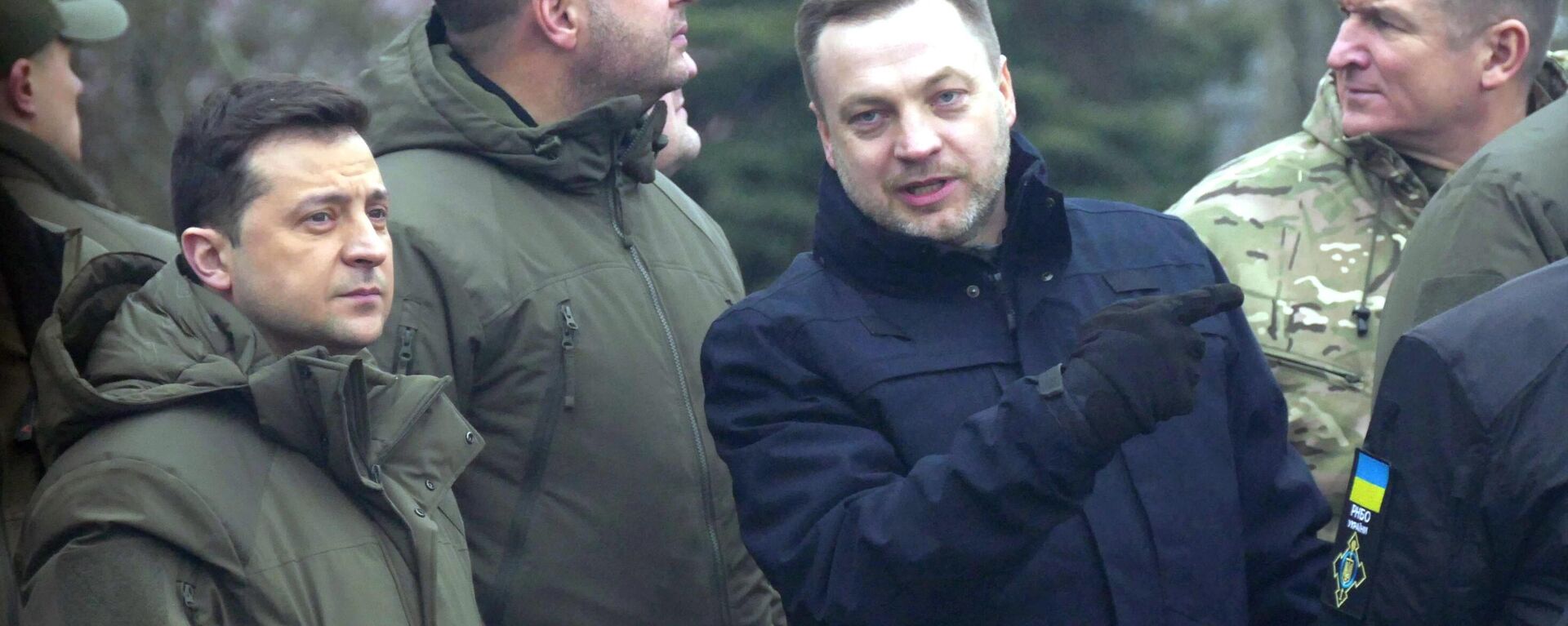
21 February 2022, 10:38 GMT
